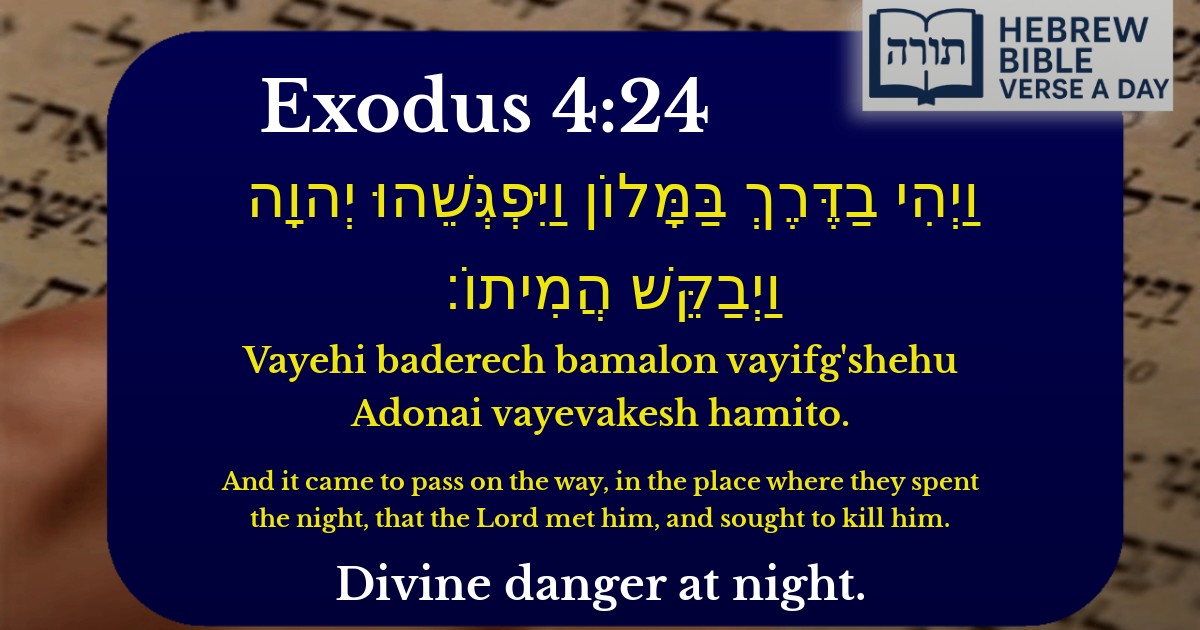Join Our Newsletter To Be Informed When New Videos Are Posted
Join the thousands of fellow Studends who rely on our videos to learn how to read the bible in Hebrew for free!
Hebrew Text
וַיְהִי בַדֶּרֶךְ בַּמָּלוֹן וַיִּפְגְּשֵׁהוּ יְהוָה וַיְבַקֵּשׁ הֲמִיתוֹ׃
English Translation
And it came to pass on the way, in the place where they spent the night, that the Lord met him, and sought to kill him.
Transliteration
Vayehi baderech bamalon vayifg'shehu Adonai vayevakesh hamito.
Hebrew Leining Text
וַיְהִ֥י בַדֶּ֖רֶךְ בַּמָּל֑וֹן וַיִּפְגְּשֵׁ֣הוּ יְהֹוָ֔ה וַיְבַקֵּ֖שׁ הֲמִיתֽוֹ׃
וַיְהִ֥י בַדֶּ֖רֶךְ בַּמָּל֑וֹן וַיִּפְגְּשֵׁ֣הוּ יְהֹוָ֔ה וַיְבַקֵּ֖שׁ הֲמִיתֽוֹ׃
🎵 Listen to leining
Parasha Commentary
📚 Talmud Citations
This verse is quoted in the Talmud.
📖 Nedarim 32a
The verse is discussed in the context of why Moses was punished for delaying the circumcision of his son, leading to the incident where God sought to kill him.


Context of the Verse
The verse (Shemot 4:24) describes an enigmatic incident where Hashem seeks to kill Moshe Rabbeinu as he returns to Egypt to fulfill his mission of redeeming Bnei Yisrael. This occurs at a lodging place (מָלוֹן) during Moshe's journey.
Rashi's Explanation
Rashi (based on the Midrash) explains that Moshe was delayed in performing the mitzvah of brit milah (circumcision) for his son Eliezer. Because of this negligence, Hashem sought to kill Moshe. Tziporah, Moshe's wife, immediately understood the danger and performed the circumcision herself, saving Moshe's life (as described in the following verses).
Rambam's Perspective
Rambam (Hilchot Milah 1:8) emphasizes the severity of neglecting this mitzvah, noting that even Moshe Rabbeinu—despite his lofty spiritual level—was held accountable for delaying his son's circumcision. This underscores that no individual, regardless of stature, is exempt from fulfilling mitzvot.
Midrashic Insights
Halachic Implications
The Shulchan Aruch (Yoreh De'ah 260:1) rules that circumcision must not be delayed unnecessarily, deriving this principle from our verse. The Rema adds that even travel does not exempt one from performing milah at the proper time.
Spiritual Lesson
This episode teaches that divine missions—even one as critical as redeeming Klal Yisrael—do not exempt a person from personal mitzvah obligations. Moshe's momentary lapse serves as an eternal reminder of the precision required in Torah observance.